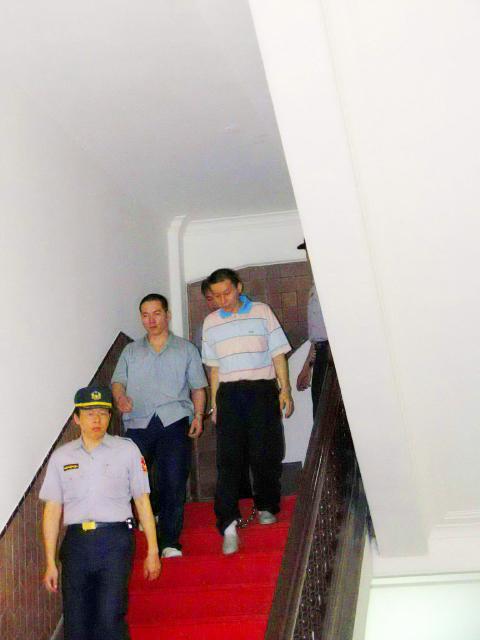The Supreme Prosecutors’ Office yesterday filed an extraordinary appeal against convicted murderer Wang Hung-wei’s (王鴻偉) death penalty, saying that he has shown remorse and is a good prospect for rehabilitation.
Wang was sentenced to death in 2009 for stabbing 20-year-old Chang Ya-ling (張雅玲) to death on Sept. 26, 2000. Wang, who was 30 at the time of the murder, had been stalking Chang after she turned down his advances, and on the night of the murder he knocked Chang unconscious with his car and then took her to a remote location where he stabbed her 176 times in the neck.
The office said that Wang was driven to murder by “loss of love,” which it said was different from premeditated murder, adding that the court failed to investigate whether there was a chance of Wang’s rehabilitation.

Photo: Sun Yu-lien, Taipei Times
Prosecutor-General Yen Ta-ho (顏大和) on Friday last week filed an extraordinary appeal on Wang’s behalf, it said.
The decision was made after a discussion regarding the police investigation report, adding that no evidence was found of intent, propensity toward murder, sexual addiction or any other “base” motivation on Wang’s part, Yen said.
Wang’s actions did not constitute extreme homicidal behavior, such as is exhibited in serial homicide cases, public mass murders and murders where victims are chosen without reason, Yen said.
The death penalty ruling did not conform with the UN’s International Covenant on Civil and Political Rights and the Safeguards Guaranteeing Protection of the Rights of those Facing the Death Penalty, Yen said.
Yen said that according to those guidelines “in countries that have not abolished the death penalty it should only be used for the most extreme offenses.”
The use of capital punishment in Wang’s case contradicts the usual practice of the Supreme Court and violates the principals of equality, Yen said.
Chang’s sister yesterday said that she was shocked to hear the news, as she did not expect the verdict to be appealed after 17 years, adding that the law now seems to protect criminals.
“Is rejection the same thing as ‘loss of love?’ Is putting a watermelon knife in one’s car not ‘premeditation’? Is a person who stabs someone 176 times able to be rehabilitated?” People First Party Deputy Secretary-General Liu Wen-hsiung (劉文雄) said on Facebook.
Liu expressed concern over the potential effects on Chang’s family and questioned the prosecutors’ sense of empathy.
Chinese Nationalist Party (KMT) caucus deputy secretary-general Lin Wei-chou (林為洲) said that filing an extraordinary appeal in Wang’s case is inappropriate, citing the multiple stab wounds and the intentional placing of the body in the parking lot where it was found.
Lin called Wang’s actions “savage” and “inhumane.”

MAKING WAVES: China’s maritime militia could become a nontraditional threat in war, clogging up shipping lanes to prevent US or Japanese intervention, a report said About 1,900 Chinese ships flying flags of convenience and fishing vessels that participated in China’s military exercises around Taiwan last month and in January last year have been listed for monitoring, Coast Guard Administration (CGA) Deputy Director-General Hsieh Ching-chin (謝慶欽) said yesterday. Following amendments to the Commercial Port Act (商港法) and the Law of Ships (船舶法) last month, the CGA can designate possible berthing areas or deny ports of call for vessels suspected of loitering around areas where undersea cables can be accessed, Oceans Affairs Council Minister Kuan Bi-ling (管碧玲) said. The list of suspected ships, originally 300, had risen to about

DAREDEVIL: Honnold said it had always been a dream of his to climb Taipei 101, while a Netflix producer said the skyscraper was ‘a real icon of this country’ US climber Alex Honnold yesterday took on Taiwan’s tallest building, becoming the first person to scale Taipei 101 without a rope, harness or safety net. Hundreds of spectators gathered at the base of the 101-story skyscraper to watch Honnold, 40, embark on his daredevil feat, which was also broadcast live on Netflix. Dressed in a red T-shirt and yellow custom-made climbing shoes, Honnold swiftly moved up the southeast face of the glass and steel building. At one point, he stepped onto a platform midway up to wave down at fans and onlookers who were taking photos. People watching from inside

Japan’s strategic alliance with the US would collapse if Tokyo were to turn away from a conflict in Taiwan, Japanese Prime Minister Sanae Takaichi said yesterday, but distanced herself from previous comments that suggested a possible military response in such an event. Takaichi expressed her latest views on a nationally broadcast TV program late on Monday, where an opposition party leader criticized her for igniting tensions with China with the earlier remarks. Ties between Japan and China have sunk to the worst level in years after Takaichi said in November that a hypothetical Chinese attack on Taiwan could bring about a Japanese

STREAMLINED: The dedicated funding would allow the US to transfer equipment to Taiwan when needed and order upgraded replacements for stockpiles, a source said The US House of Representatives on Thursday passed a defense appropriations bill totaling US$838.7 billion, of which US$1 billion is to be allocated to reinforcing security cooperation with Taiwan and US$150 million to replace defense articles provided to the nation. These are part of the Consolidated Appropriation Act, which the US House yesterday passed with 341 votes in favor and 88 against. The act must be passed by the US Senate before Friday next week to avoid another government shutdown. The US House Committee on Appropriations on Monday unveiled the act, saying that it allocates US$1 billion for the Taiwan Security Cooperation Initiative